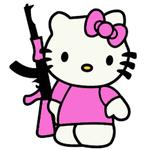@broilers @HistoryAss @derpreusse @Glünggi @Achill @sheepleslayer @ThunderBird1 wenn man Begriff FSA überhaupt noch braucht, sollte man schon die Namen der Brigaden angeben,
da es eine FSA so gar nicht gibt. So sind sogenannte FSA Gruppen gegen eine Unterstützung der Kurden, die sie als Ungläubige sowie Verbündete Assads sehen.
"“Many FSA groups, especially the secular factions have come to the Kurdish areas to fight against IS. It has been six months since the YPG and FSA started coordinating and working together," said Iso." - See more at:
http://www.middleeasteye.net/news/fsa-factions-help-kurds-fight-against-332849434#sthash.iHsEBEaS.dpufGuter Artikel,
"FROM the start, United States President Barack Obama’s Syria policy has foundered because of a gap between words and deeds. And, he’s done it again. Having declared that the aim of American policy was to “degrade and ultimately destroy” the Islamic State (IS), Obama now finds himself pressured to escalate military action in Syria. This is a path destined for failure. In fact, the administration should abandon its lofty rhetoric and make clear that it is focused on a strategy against IS that is actually achievable — containment.
Escalation in Syria cannot meet American objectives, and is almost certain to produce chaos and unintended consequences. The central reality is that Washington has no serious local partners on the ground. It is important to understand that the Free Syrian Army (FSA) doesn’t actually exist. A Congressional Research Service report has pointed out that the name does not refer to any “organised command and control structure with national reach”. The director of national intelligence has testified that the opposition to the Bashar al-Assad regime comprised 1,500 separate militias. We call a bunch of these militias — that are anti-Assad and also anti-Islamist (we hope) — FSA.
Scholar Joshua Landis, whose blog “Syria Comment” is an essential source, estimated that the Assad regime controlled about half of Syrian territory, though much more of the population. IS controls about one-third of the country and the other militias control a little less than 20 per cent. But, the largest and most effective of these non-IS groups are al-Qaeda-affiliated and deadly enemies of the US.
The non-jihadi groups collectively control less than five per cent of Syria.
Landis has written that, according to opposition leaders, Washington was supporting about 75 of these groups.
An American strategy of escalating airstrikes in Syria — even if coupled with ground forces — would wish that the weakest and most disorganised forces in the country somehow became the strongest, first defeating IS, then the Assad regime, all the while fighting off Jabhat al-Nusra and Khorasan. The chance that all this will happen is remote. Far more likely, bombings in Syria will produce chaos and instability on the ground, further destroying Syria and promoting the free-for-all in which jihadi groups thrive.
The critics are sure this policy would have been easy three years ago, when the opposition to Assad was more secular and democratic. This is a fantasy. It’s true that the demonstrations against the Assad regime in the initial months seemed to be carried out by more secular and liberal people. This was also true in Libya and Egypt.
But over time, more organised, passionate and religious forces triumphed. This is a familiar pattern in revolutions — from the French to the Russian to the Iranian ones. They were begun by liberals and taken over by radicals. For any strategy to work in Syria, it needs a military component and a political one. The military element is weak. The political one is nonexistent.
.."
http://www.nst.com.my/node/44062 (Archiv-Version vom 19.10.2014) broilers schrieb:Es waren die Rebellen die den Krieg in die Kurdengebiete brachten, nicht die syrische Regierung!
broilers schrieb:Es waren die Rebellen die den Krieg in die Kurdengebiete brachten, nicht die syrische Regierung!
Nicht nur in Kurdengebieten!
Z.B. die Ölanlagen in Raqqa, Deir Ezzur,
nun von US plus Saudi-Arabien, Jordanien, Vereinigten Arabische Emirate und Bahrain, bombardiert ..
erobert Feb. 2013 von Liwa al-Islam
"Seit Februar ist das in der syrischen Provinz Rakka gelegene Ölfeld al-Thaura in Rebellenhand, unter Kontrolle der Gruppe Liwa al-Islam. Dieses Islam-Bataillon ist einer der islamistischen Rebellentrupps, die in der kargen Steinwüste im Nordosten Syrien agieren. Seine Männer rivalisieren dabei mit anderen Rebellengruppen um die Vorherrschaft. Dabei geht es um die richtige Ideologie und den Grad an Religiosität, vor allem aber um Geld: Denn nur die Einheiten, die Waffen, Munition und Verpflegung beschaffen können, haben im dritten Jahr des Kriegs gegen das Regime Baschar al-Assads eine Chance. "
http://www.spiegel.de/politik/ausland/rohstoffe-in-syrien-rebellen-verschleudern-oel-zu-dumping-preisen-a-899972.htmlFeb.2014
"Deshalb wird der Kampf um die Bodenschätze unter den Rebellen erbittert geführt. Am Wochenanfang gelang es einer Allianz unter der Führung des Qaida-Ablegers Nusra-Front, ihre Rivalen von ISIS aus der ölreichen Provinz Deir al-Sor zu vertreiben."
http://www.spiegel.de/politik/ausland/oel-in-syrien-extremisten-kontrollieren-die-meisten-felder-im-osten-a-954912.htmlJuni 2014
"Den Angaben nach übernahmen die Dschihadisten in mehreren Vierteln von Dair as-Saur die Kontrolle, nachdem sich andere islamistische Gruppen wie die Al-Nusra-Front zurückgezogen hatten. Damit habe die Terrorgruppe nun rund 95 Prozent der gleichnamigen ölreichen Provinz Dair as-Saur erobert. Anfang des Monats hatte sie dort bereits das wichtige Ölfeld Al-Omar kampflos von der Al-Nusra-Front übernommen."
http://www.tagesschau.de/ausland/isis-syrien-106.html (Archiv-Version vom 19.10.2014)








